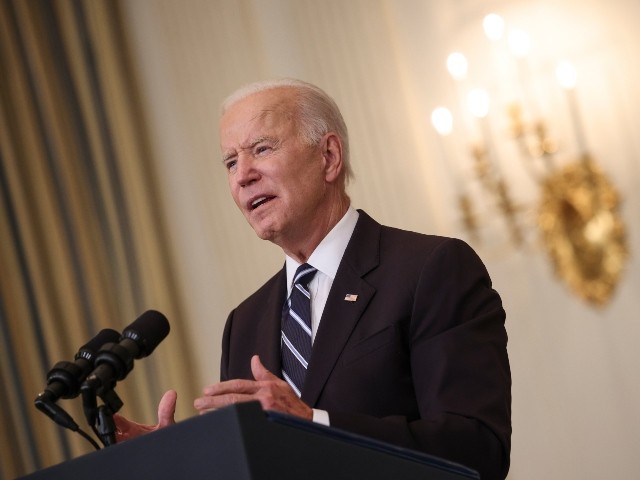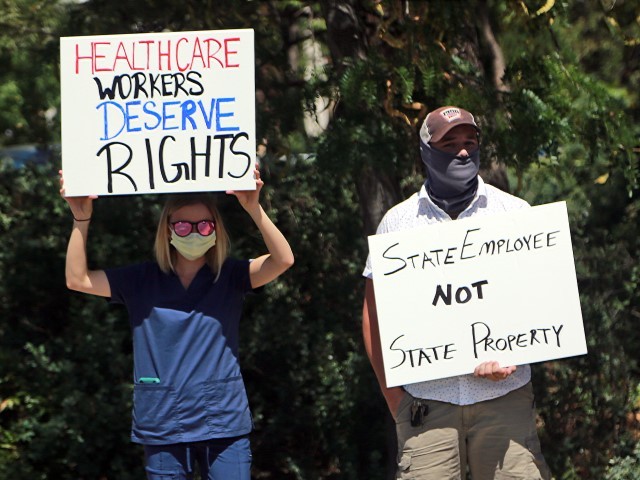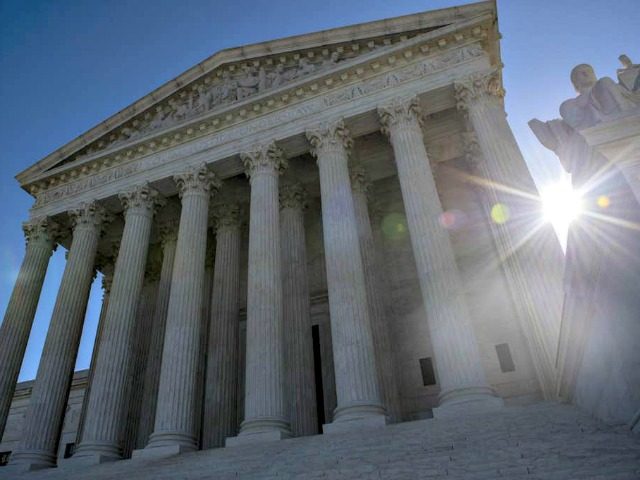WASHINGTON, DC — The Supreme Court dealt a massive blow to President Joe Biden’s COVID-19 policy, striking down his massive vaccine mandate on employers while upholding a smaller mandate on healthcare workers — though workers can still opt out of that mandate if they have a religious objection or medical concern.
“OSHA has never before imposed such a mandate. Nor has Congress,” the court’s opinion in NFIB v. OSHA began. “Indeed, although Congress has enacted significant legislation addressing the COVID–19 pandemic, it has declined to enact any measure similar to what OSHA has promulgated here.”
“Administrative agencies are creatures of statute. They accordingly possess only the authority that Congress has provided. The Secretary has ordered 84 million Americans to either obtain a COVID–19 vaccine or undergo weekly medical testing at their own expense,” the opinion continued. “This is no everyday exercise of federal power. It is instead a significant encroachment into the lives—and health—of a vast number of employees. We expect Congress to speak clearly when authorizing an agency to exercise powers of vast economic and political significance.”
“The question, then, is whether the Act plainly authorizes the Secretary’s mandate. It does not,” declared the court. “The Act empowers the Secretary to set workplace safety standards, not broad public health measures.”

U.S. President Joe Biden speaks about combatting the coronavirus pandemic in the State Dining Room of the White House on September 9, 2021, in Washington, DC. Biden is instructing the Department of Labor to draft a rule mandating that all businesses with 100 or more employees require their workers to get vaccinated or face weekly testing. (Photo by Kevin Dietsch/Getty Images)
The 6-3 decision continued:
Although COVID–19 is a risk that occurs in many workplaces, it is not an occupational hazard in most. COVID–19 can and does spread at home, in schools, during sporting events, and everywhere else that people gather. That kind of universal risk is no different from the day-to-day dangers that all face from crime, air pollution, or any number of communicable diseases. Permitting OSHA to regulate the hazards of daily life—simply because most Americans have jobs and face those same risks while on the clock—would significantly expand OSHA’s regulatory authority without clear congressional authorization.
“OSHA’s indiscriminate approach fails to account for this crucial distinction—between occupational risk and risk more generally—and accordingly the mandate takes on the character of a general public health measure, rather than an occupational safety or health standard,” the justices explained.
“In fact,” they added, peaking into the politics of the situation, “the most noteworthy action concerning the vaccine mandate by either House of Congress has been a majority vote of the Senate disapproving the regulation on December 8, 2021.”
“It is telling that OSHA, in its half century of existence, has never before adopted a broad public health regulation of this kind—addressing a threat that is untethered, in any causal sense, from the workplace,” the court noted. “This lack of historical precedent, coupled with the breadth of authority that the Secretary now claims, is a telling indication that the mandate extends beyond the agency’s legitimate reach.”
“In our system of government, that is the responsibility of those chosen by the people through democratic processes,” the majority concluded. “Although Congress has indisputably given OSHA the power to regulate occupational dangers, it has not given that agency the power to regulate public health more broadly. Requiring the vaccination of 84 million Americans, selected simply because they work for employers with more than 100 employees, certainly falls in the latter category.”
The shoe was on the other foot in Biden v. Missouri, challenging the CMS mandate on healthcare providers.
The 5-4 liberal-led majority explained that “in order to receive Medicare and Medicaid funding, participating facilities must ensure that their staff—unless exempt for medical or religious reasons—are vaccinated against COVID–19.”
The court noted the smaller scope, however, elaborating that the “rule requires providers to offer medical and religious exemptions, and does not cover staff who telework full-time.”
The Biden administration invoked two statutory provisions as providing power to impose the mandate. One authorizes the Department of Health and Human Services (HHS) to “publish such rules and regulations … as may be necessary to the efficient administration of [HHS’s] functions.” The other authorizes CMS — a component of HHS — to “prescribe such regulations as may be necessary to carry out the administration of the insurance programs” under the Medicare Act.

Nurse Katrina Philpot protests against COVID-19 vaccine and mask mandates demonstrate near the state Capitol on Friday, Aug. 20, 2021, in Santa Fe, NM. (AP Photo/Cedar Attanasio)
“COVID–19 is a highly contagious, dangerous, and—especially for Medicare and Medicaid patients—deadly disease,” the court reasoned. “[HHS] determined that a COVID–19 vaccine mandate will substantially reduce the likelihood that healthcare workers will contract the virus and transmit it to their patients.”
“The challenges posed by a global pandemic do not allow a federal agency to exercise power that Congress has not conferred upon it,” the majority admitted. “At the same time, such unprecedented circumstances provide no grounds for limiting the exercise of authorities the agency has long been recognized to have.”
The conservatives on the court — Justices Clarence Thomas, Samuel Alito, Neil Gorsuch, and Amy Coney Barrett — dissented.
Thomas wrote the first dissent, joined by all the conservative justices, asserting that:
… here, the Government proposes to find virtually unlimited vaccination power, over millions of healthcare workers, in definitional provisions, a saving clause, and a provision regarding long-term care facilities’ sanitation procedures. The Government has not explained why Congress would have used these ancillary provisions to house what can only be characterized as a “fundamental detail” of the statutory scheme. Had Congress wanted to grant CMS power to impose a vaccine mandate across all facility types, it would have done what it has done elsewhere—specifically authorize one.
“We expect Congress to speak clearly when authorizing an agency to exercise powers of vast economic and political significance. And we expect Congress to use exceedingly clear language if it wishes to significantly alter the balance between state and federal power,” Thomas wrote. “The omnibus rule is undoubtedly significant—it requires millions of healthcare workers to choose between losing their livelihoods and acquiescing to a vaccine they have rejected for months … If Congress had wanted to grant CMS authority to impose a nationwide vaccine mandate, and consequently alter the state-federal balance, it would have said so clearly. It did not.”
Justice Alito also wrote a dissent, likewise joined by all the other conservative justices.
Alito explained that “even if the Federal Government has the authority to require the vaccination of healthcare workers, it did not have the authority to impose that requirement in the way it did. Under our Constitution, the authority to make laws that impose obligations on the American people is conferred on Congress, whose Members are elected by the people.”
“Today’s decision will ripple through administrative agencies’ future decisionmaking. The Executive Branch already touches nearly every aspect of Americans’ lives,” Alito explained. “Neither CMS nor the Court articulates a limiting principle for why, after an unexplained and unjustified delay, an agency can regulate first and listen later, and then put more than 10 million healthcare workers to the choice of their jobs or an irreversible medical treatment.”
The applications are NFIB v. OSHA, No. 21A244 at the Supreme Court of the United States, and Biden v. Missouri, No. 21A240 in the Supreme Court of the United States.
Ken Klukowski served in the White House Office of Management and Budget and the U.S. Department of Justice, and is a Breitbart News contributor.

COMMENTS
Please let us know if you're having issues with commenting.